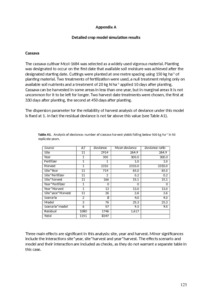Resource information
Climate-induced livelihood transitons in the agricultural systems of Africa are increasingly likely. There has been only limited study on what such transitons might look like, but it is clear that the implicatons could be profound in relaton to social, environmental, economic and politcal efects at local and natonal levels. The work here was set up to test the hypothesis that sedentary farmers who currently keep livestock in transiton zones that may become warmer and possibly drier in the future may ultmately be forced to increase their reliance on livestock vis-a?-vis cropping in the future. We carried out feldwork in 12 sites in Kenya, Tanzania and Uganda to understand how farming systems have been changing in the recent past. We then evaluated what the impacts of these changes, and further changes in the same directon, may be on household incomes and food security in the coming decades, using crop and household modelling. We found no direct evidence for the hypothesised extensifcaton of agricultural producton in the study sites. Indeed, the processes of farming systems evoluton in East Africa are substantally conditoned by powerful socio-cultural processes, it appears.



